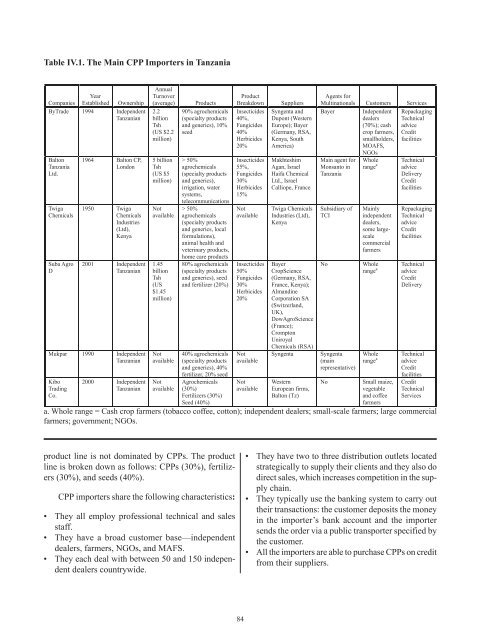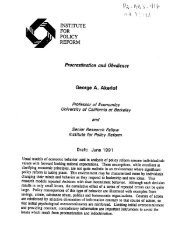An Action Plan for Developing Agricultural Input Markets in Tanzania
An Action Plan for Developing Agricultural Input Markets in Tanzania
An Action Plan for Developing Agricultural Input Markets in Tanzania
You also want an ePaper? Increase the reach of your titles
YUMPU automatically turns print PDFs into web optimized ePapers that Google loves.
Table IV.1. The Ma<strong>in</strong> CPP Importers <strong>in</strong> <strong>Tanzania</strong><br />
a. Whole range = Cash crop farmers (tobacco coffee, cotton); <strong>in</strong>dependent dealers; small-scale farmers; large commercial<br />
farmers; government; NGOs.<br />
product l<strong>in</strong>e is not dom<strong>in</strong>ated by CPPs. The product<br />
l<strong>in</strong>e is broken down as follows: CPPs (30%), fertilizers<br />
(30%), and seeds (40%).<br />
CPP importers share the follow<strong>in</strong>g characteristics:<br />
• They all employ professional technical and sales<br />
staff.<br />
• They have a broad customer base—<strong>in</strong>dependent<br />
dealers, farmers, NGOs, and MAFS.<br />
• They each deal with between 50 and 150 <strong>in</strong>dependent<br />
dealers countrywide.<br />
84<br />
• They have two to three distribution outlets located<br />
strategically to supply their clients and they also do<br />
direct sales, which <strong>in</strong>creases competition <strong>in</strong> the supply<br />
cha<strong>in</strong>.<br />
• They typically use the bank<strong>in</strong>g system to carry out<br />
their transactions: the customer deposits the money<br />
<strong>in</strong> the importer’s bank account and the importer<br />
sends the order via a public transporter specified by<br />
the customer.<br />
• All the importers are able to purchase CPPs on credit<br />
from their suppliers.

















